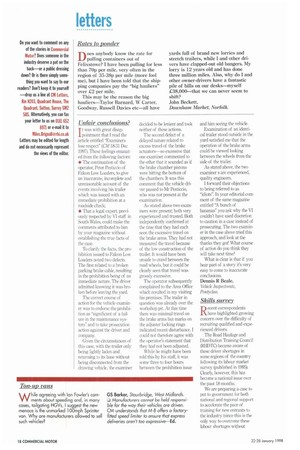Unfair conclusions?
Page 20

If you've noticed an error in this article please click here to report it so we can fix it.
T t was with great disap pointment that I read the article entitled "Examiners lose respect" (CM18-31 Dec 1997). These feelings emanated from the following factors: • The continuation of the operator, Peter Pesticcio of Falcon LOW Loaders, to give an inaccurate, incomplete and unreasonable account of the events involving his trailer which was issued with an immediate prohibition at a roadside check;
• That a legal expert, previously respected by VI staff in South Wales, could make the comments attributed to him by your magazine without establishing the true facts of the case.
To clarify the facts, the prohibition issued to Falcon Low Loaders noted two defects. The first related to a broken parking brake cable, resulting in the prohibition being of an immediate nature. The driver admitted knowing it was broken before leaving the yard.
The correct course of action for the vehicle examiner was to endorse the prohibition as "significant of a failure in the maintenance system" and to take prosecution action against the driver and company.
Given the circumstances of this case, with the trailer only being lightly laden and returning to its base without being disconnected from the drawing vehicle, the examiner
decided to be lenient and took neither of these actions.
The second defect of a delayed nature related to excess travel of the brake actuators—so excessive that one examiner commented to the other that it sounded as if the brake chamber pistons were hitting the bottom of the chambers, It was this comment that the vehicle driver passed to Mr Pesticcio, who was not present at the examination.
As stated above two examiners were present; both very experienced and trusted. Both independently confirmed at the time that they had each seen the excessive travel on the brake arms. They had not measured the travel because of the low construction of the trailer. It would have been unsafe to crawl between the road wheels, but it could be clearly seen that travel was grossly excessive.
The operator subsequently complained to the Area Office which resulted in my visiting his premises. The trailer in question was already over the workshop pit. At this time there was minimal travel on the brake arms but marks on the adjuster locking rings indicated recent disturbance. I could not therefore agree with the operator's statement that they had not been adjusted.
While he might have been told this by his staff, it was some three to four hours between the prohibition issue and him seeing the vehicle.
Examination of an identical trailer stood outside in the yard satisfied me that the operation of the brake arms could be viewed looking between the wheels from the side of the trailer.
As stated above, the two examiner s are experienced, quality engineers I forward their objections to being referred to as "idiots". In your editorial comment of the same magazine entitled "A bunch of bananas" you ask why the VI couldn't have used discretion to caution in a case instead of prosecuting. The two examiner in the case above tried this approach, and look at the thanks they got! What course of action do you think they will take next time?
What is clear is that if you hear part of a story it's very easy to come to inaccurate conclusions.
Dennis R Beale,
Vehicle inspectorate, Pontyclum






































































































